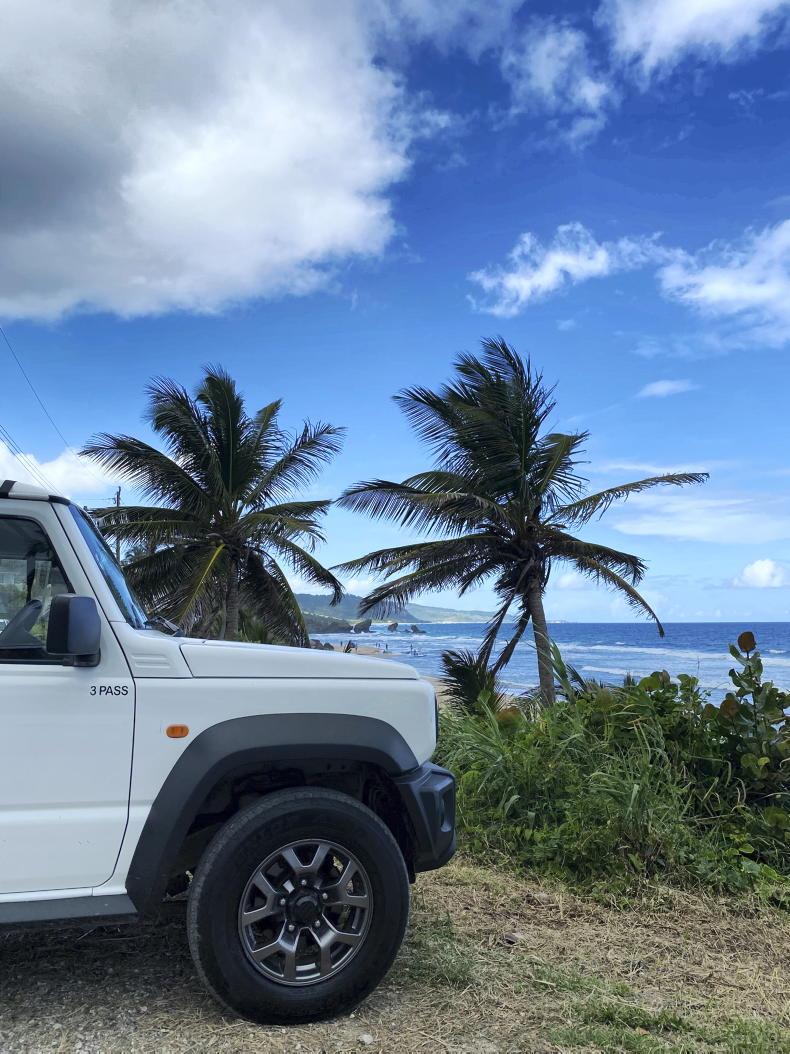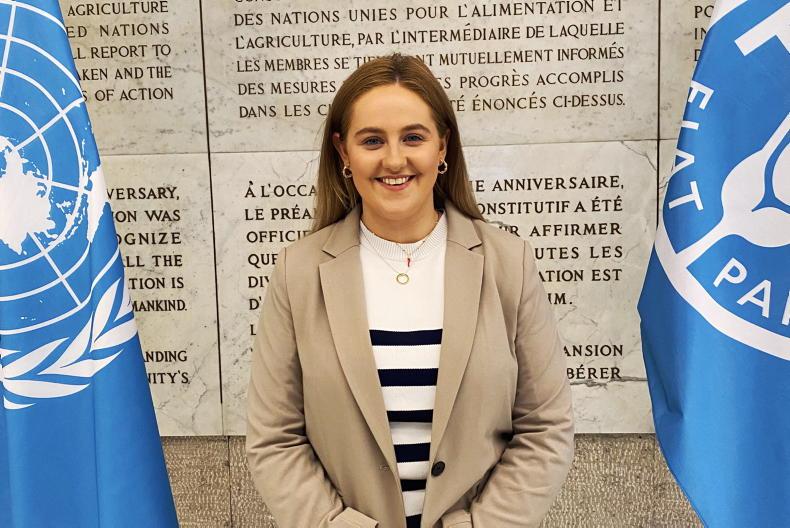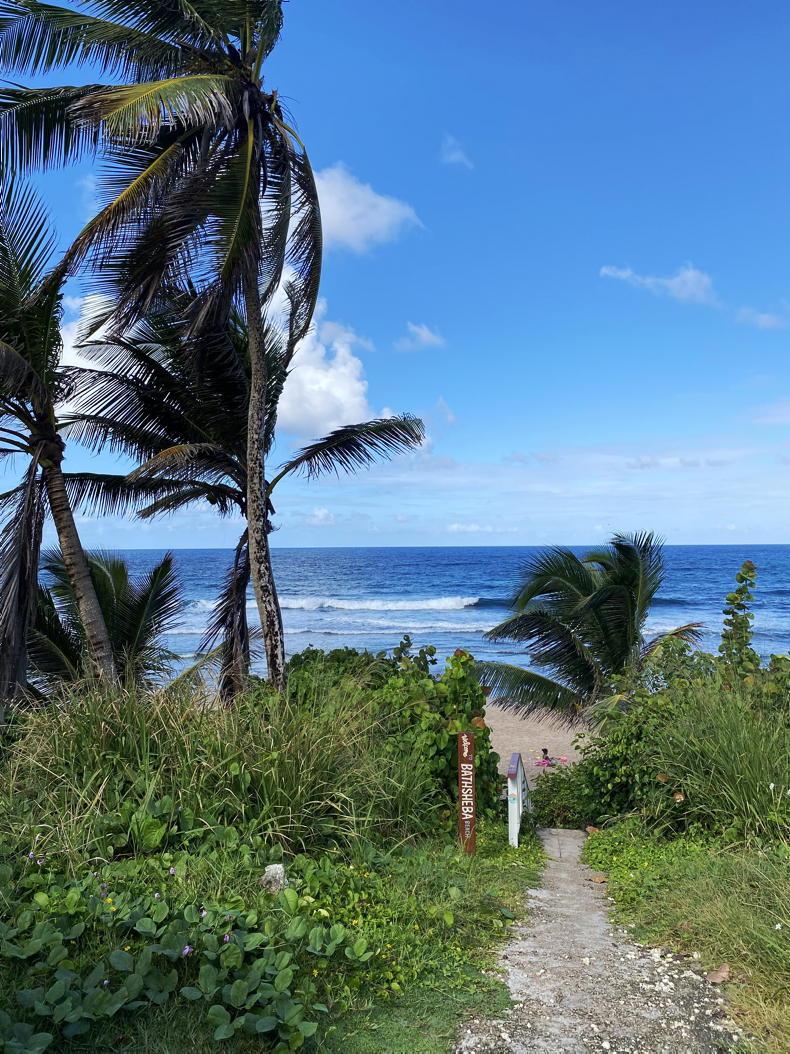This Christmas is certainly going to be memorable for Limerick-born and raised dairy farmer Gráinne Ahern who will be celebrating in Barbados. She made the move there two months ago and is currently working for UN Women on projects and programmes aimed at supporting women who have been disproportionately affected by climate change and disasters.
So how did this come about? At a young age, Gráinne had a curiosity for agriculture which was encouraged by her father Cathal on their dairy farm in Dromcolliher.
British Friesian cows
“Growing up, there was four of us at home – my dad Cathal, my mum Winifred, and my sister Jennifer. Dad started milking British Friesian cows in the 80s with my grandad who had farmed the land before him. It’s funny because I never really questioned agriculture, I always saw it as just part of our family,” Gráinne says.
During the Leaving Certificate cycle, Gráinne was studying business but dropped it as she didn’t find it enjoyable. Her dad encouraged her to take up ag science in its place.

Bathsheba, St Joseph, Barbados.
“I was sitting in the classroom and I was thinking to myself, everything I see my dad doing now makes sense. Little things like why the cows go out to grass at a certain time of year, that all started to add up,” she says.
Harvesting an interest
Gráinne had veterinary science as her number option on the CAO and missed it by four points.
“I knew in my heart, I didn’t want to do veterinary, I wanted to do ag science. I went up to University College Dublin (UCD) for the open day and attended both the veterinary and ag science talk. Veterinary was top of my list but it’s a blessing I didn’t get it,” she says.
With all of her friends going to college in University of Limerick, it was a big move to study in Dublin. She found it difficult at the beginning but it wasn’t long until she felt at home.
“The ag school in UCD is a family, we all look after each other. I met friends for life but college wasn’t always easy – we had COVID-19 in the middle,” she says.

Gráinne Ahern at the Food and Agricultural Organisation of the United Nations HQ, Rome, Italy.
Third year stood out because the modules were getting into the specifics of animal and livestock production and she did eight months of placement.
“I loved placement. For me, it was my first experience working on a different farm outside of our own. I went to Michael Farrelly’s 360 cow unit in Meath, there were two calf managers and two herd managers. It really helped my confidence.”
Initially, Gráinne wanted to move to New Zealand, milk cows and travel the world but when she finished her undergraduate degree that went out the window because of COVID-19.
Weighing up her options, she decided to do the agriculture extension and innovation masters in UCD as she wanted to go down the education and advisory route. During one of her lectures with Monica O’Gorman, she finally found her specific ‘grá’ for agriculture.
“We spoke about farmer education and the impact that extension services have on farmers and the social and economic sustainability of that rural community. It was a major turning point for me,” she says.
She was awarded an academic bursary four weeks into the master’s programme from the FDC group, an agricultural service provider. For 12 months after her masters, Gráinne worked in their professional services department.
Making the move over sea’s
Being interested in agricultural development, Gráinne wanted to explore the experiences of people in other countries. “Irish agriculture is only one piece in the puzzle and I wanted to learn and understand the lives of other rural people and farmers across the world,” she says.
After seeing an internship with the Food and Agriculture Organisation (FAO) in Rome advertised on LinkedIn, Gráinne applied and successfully got offered the role.
“It was a no brainer for me, I knew I wanted to travel and that it would be a fantastic career experience. I went on my own, I didn’t speak Italian or have accommodation, all I had was a job and a suitcase. I had the best nine months of my life,” she says.
FAO runs over five regions and Gráinne was based in the headquarters working as a climate smart agriculture and nature-based solutions intern.
“I represented the organisation in different international capacities. Towards the end of my time there I worked with the youth organisation YUNGA (Youth and United Nations Global Alliance) where we incorporated non-formal education like climate change and the environment to the likes of non-formal education groups like scouts, girl guides and brownies,” Gráinne explains.
Empowerment of women
Wanting a more hands on experience working on the ground, Gráinne saw a position advertised with UN Women, the United Nations entity for gender equality and the empowerment of women.

Bathsheba, St Joseph, Barbados.
“Up to this point, all of my experience was in the agriculture production space and climate adaptation. I knew from my masters that I was passionate about rural livelihoods and communities. Gender-responsive climate change and disaster risk resilience brings me into the social space of women who are disproportionately affected by climate change and disasters,” she says.
Gráinne is now working for the UN Women Multiculture Office which covers each Caribbean Island in the state.
“The Caribbean is the second most affected region in the world by natural disasters, unfortunately women are disproportionately affected. UN Women work to support and create programmes, projects and funding for these women,” explains Gráinne.
Since moving to Barbados, Gráinne has climatised to the heat and is settling into life there.
“It was 26 degrees one evening and I had to go inside for a jumper because I found it cool. So that is a different part of life that I have to get accustomed to. Bajan people are extremely kind and friendly, and they feel a real connection with Irish people. One thing I love is how proud they are of their island,” she says.
Christmas traditions
Back in Ireland, Gráinne’s Christmas at home would normally be simple and quiet, it will be strange for her spending it half way across the world.
“This is my first Christmas away from home, so I will miss my family and precious German Shephards a lot, of course. For us as a family, it’s a quiet day of quality time. We cook together, share stories and play cards together. I think what I will miss the most is the simplicity of just being cozy in front of the fire, watching a movie, with a cup of tea and turkey and ham sandwich,” she explains.
This year Gráinne is looking forward to embracing new traditions and spending Christmas Day on a beach while still getting to eat baked ham.
“I’m excited to spend Christmas in Barbados, as the celebrations are very similar to Ireland in many ways. Christmas here is all about spending time with family and loved ones. It’s funny to see Christmas lights and to hear ‘Jingle Bells’ playing whilst beside the beach in 30-degree heat.
“Food is a big part of every celebration for Bajans. At Christmas, they have baked ham, which is a welcome familiarity, and they also have a desert called a Great Cake, which is somewhat similar to Christmas pudding, but laced in rum,” says Gráinne.
Read more
Agri Careers: lack of accommodation directly impacting academic performance
Agri Careers: Meath student’s poem scoops 'From Foal to Race' prize
This Christmas is certainly going to be memorable for Limerick-born and raised dairy farmer Gráinne Ahern who will be celebrating in Barbados. She made the move there two months ago and is currently working for UN Women on projects and programmes aimed at supporting women who have been disproportionately affected by climate change and disasters.
So how did this come about? At a young age, Gráinne had a curiosity for agriculture which was encouraged by her father Cathal on their dairy farm in Dromcolliher.
British Friesian cows
“Growing up, there was four of us at home – my dad Cathal, my mum Winifred, and my sister Jennifer. Dad started milking British Friesian cows in the 80s with my grandad who had farmed the land before him. It’s funny because I never really questioned agriculture, I always saw it as just part of our family,” Gráinne says.
During the Leaving Certificate cycle, Gráinne was studying business but dropped it as she didn’t find it enjoyable. Her dad encouraged her to take up ag science in its place.

Bathsheba, St Joseph, Barbados.
“I was sitting in the classroom and I was thinking to myself, everything I see my dad doing now makes sense. Little things like why the cows go out to grass at a certain time of year, that all started to add up,” she says.
Harvesting an interest
Gráinne had veterinary science as her number option on the CAO and missed it by four points.
“I knew in my heart, I didn’t want to do veterinary, I wanted to do ag science. I went up to University College Dublin (UCD) for the open day and attended both the veterinary and ag science talk. Veterinary was top of my list but it’s a blessing I didn’t get it,” she says.
With all of her friends going to college in University of Limerick, it was a big move to study in Dublin. She found it difficult at the beginning but it wasn’t long until she felt at home.
“The ag school in UCD is a family, we all look after each other. I met friends for life but college wasn’t always easy – we had COVID-19 in the middle,” she says.

Gráinne Ahern at the Food and Agricultural Organisation of the United Nations HQ, Rome, Italy.
Third year stood out because the modules were getting into the specifics of animal and livestock production and she did eight months of placement.
“I loved placement. For me, it was my first experience working on a different farm outside of our own. I went to Michael Farrelly’s 360 cow unit in Meath, there were two calf managers and two herd managers. It really helped my confidence.”
Initially, Gráinne wanted to move to New Zealand, milk cows and travel the world but when she finished her undergraduate degree that went out the window because of COVID-19.
Weighing up her options, she decided to do the agriculture extension and innovation masters in UCD as she wanted to go down the education and advisory route. During one of her lectures with Monica O’Gorman, she finally found her specific ‘grá’ for agriculture.
“We spoke about farmer education and the impact that extension services have on farmers and the social and economic sustainability of that rural community. It was a major turning point for me,” she says.
She was awarded an academic bursary four weeks into the master’s programme from the FDC group, an agricultural service provider. For 12 months after her masters, Gráinne worked in their professional services department.
Making the move over sea’s
Being interested in agricultural development, Gráinne wanted to explore the experiences of people in other countries. “Irish agriculture is only one piece in the puzzle and I wanted to learn and understand the lives of other rural people and farmers across the world,” she says.
After seeing an internship with the Food and Agriculture Organisation (FAO) in Rome advertised on LinkedIn, Gráinne applied and successfully got offered the role.
“It was a no brainer for me, I knew I wanted to travel and that it would be a fantastic career experience. I went on my own, I didn’t speak Italian or have accommodation, all I had was a job and a suitcase. I had the best nine months of my life,” she says.
FAO runs over five regions and Gráinne was based in the headquarters working as a climate smart agriculture and nature-based solutions intern.
“I represented the organisation in different international capacities. Towards the end of my time there I worked with the youth organisation YUNGA (Youth and United Nations Global Alliance) where we incorporated non-formal education like climate change and the environment to the likes of non-formal education groups like scouts, girl guides and brownies,” Gráinne explains.
Empowerment of women
Wanting a more hands on experience working on the ground, Gráinne saw a position advertised with UN Women, the United Nations entity for gender equality and the empowerment of women.

Bathsheba, St Joseph, Barbados.
“Up to this point, all of my experience was in the agriculture production space and climate adaptation. I knew from my masters that I was passionate about rural livelihoods and communities. Gender-responsive climate change and disaster risk resilience brings me into the social space of women who are disproportionately affected by climate change and disasters,” she says.
Gráinne is now working for the UN Women Multiculture Office which covers each Caribbean Island in the state.
“The Caribbean is the second most affected region in the world by natural disasters, unfortunately women are disproportionately affected. UN Women work to support and create programmes, projects and funding for these women,” explains Gráinne.
Since moving to Barbados, Gráinne has climatised to the heat and is settling into life there.
“It was 26 degrees one evening and I had to go inside for a jumper because I found it cool. So that is a different part of life that I have to get accustomed to. Bajan people are extremely kind and friendly, and they feel a real connection with Irish people. One thing I love is how proud they are of their island,” she says.
Christmas traditions
Back in Ireland, Gráinne’s Christmas at home would normally be simple and quiet, it will be strange for her spending it half way across the world.
“This is my first Christmas away from home, so I will miss my family and precious German Shephards a lot, of course. For us as a family, it’s a quiet day of quality time. We cook together, share stories and play cards together. I think what I will miss the most is the simplicity of just being cozy in front of the fire, watching a movie, with a cup of tea and turkey and ham sandwich,” she explains.
This year Gráinne is looking forward to embracing new traditions and spending Christmas Day on a beach while still getting to eat baked ham.
“I’m excited to spend Christmas in Barbados, as the celebrations are very similar to Ireland in many ways. Christmas here is all about spending time with family and loved ones. It’s funny to see Christmas lights and to hear ‘Jingle Bells’ playing whilst beside the beach in 30-degree heat.
“Food is a big part of every celebration for Bajans. At Christmas, they have baked ham, which is a welcome familiarity, and they also have a desert called a Great Cake, which is somewhat similar to Christmas pudding, but laced in rum,” says Gráinne.
Read more
Agri Careers: lack of accommodation directly impacting academic performance
Agri Careers: Meath student’s poem scoops 'From Foal to Race' prize









 This is a subscriber-only article
This is a subscriber-only article











SHARING OPTIONS: